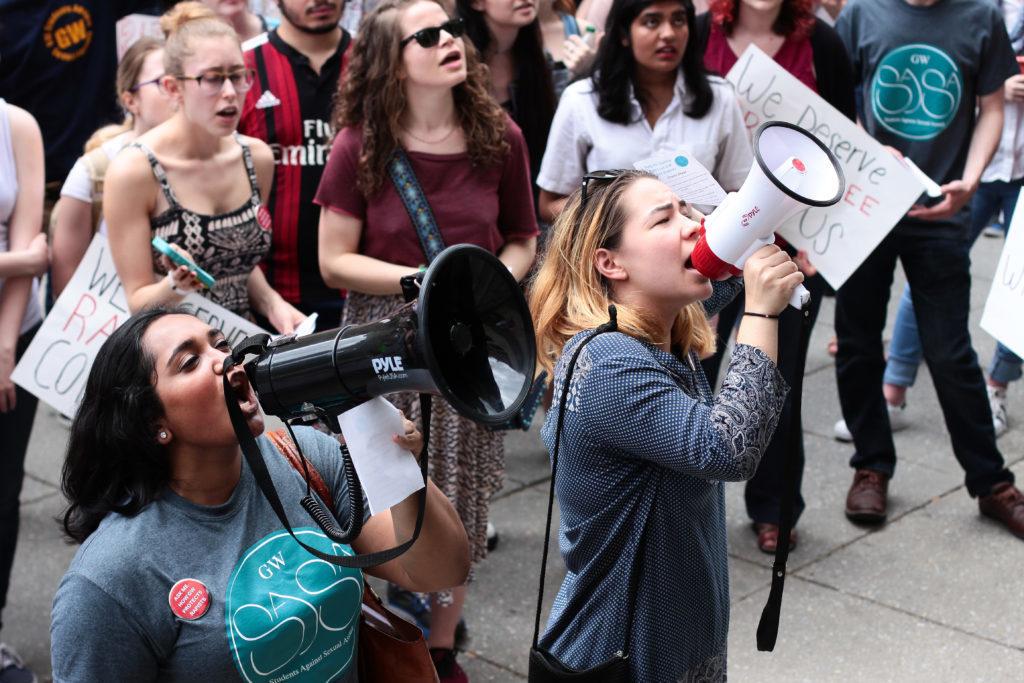Proposed changes to federal Title IX guidelines will likely give accused perpetrators at GW a greater voice in the case process, experts said.
Education Secretary Betsy DeVos announced Thursday that the Department of Education would seek to rescind Obama-era directives to colleges and universities aimed at combating campus sexual assault, calling Title IX enforcement a “failed system” that often trampled the rights of the accused.
Title IX experts and advocates said the proposed changes would be damaging to sexual assault survivors by encouraging “victim-blaming” and would make an already painful decision to report an instance of sexual violence more difficult.
Officials declined to comment directly on DeVos’ speech or the proposed policy change. University spokeswoman Maralee Csellar said officials will closely monitor the processes that DeVos described in her address, especially as the University reviews its own Title IX procedures.
“We take issues of sexual misconduct and sexual violence very seriously and we are committed to having a strong Title IX program that supports our community,” Csellar said in an email.
Csellar declined to say what changes the University anticipates could be made to its own Title IX procedures as a result of the federal policy change.
Officials ordered a review of the University’s Title IX case process by outside legal experts in July.
DeVos’ announcement comes as her agency investigates GW for its alleged mishandling of a sexual violence complaint.
Although DeVos’ remarks suggest alterations in the process of future probes, experts said it is too soon to tell how Title IX changes under the new administration will affect the investigation process.
In her address at George Mason University, DeVos said the accused should have greater latitude to defend themselves, but said the current guidelines – encouraging universities to lower the burden of proof in sexual assault cases – do not allow for that.
“The current system hasn’t won widespread support, nor has it inspired confidence in its so-called judgement,” she said in the speech.
Kalpana Vissa, the co-president of Students Against Sexual Assault, said officials should pledge to support survivors and uphold the DOE’s recommendations from the “Dear Colleague Letter” in 2011, despite potential changes under the Trump administration.
The letter calls for better training for employees on how to help students reporting cases of sexual violence and for more immediate assistance to survivors who report an incident.
“We are obviously disheartened and disgusted by the latest news,” Vissa said in an email. “This is not going to stop us and we are going to come back stronger than ever to support survivors and do our best to grant them the justice they deserve.”
In 2014, the University signed onto the “It’s On Us” campaign, a nationwide sexual assault prevention effort launched under the Obama administration. The campaign called on universities to implement bystander-intervention training and hold events for athletic departments focused on preventing sexual misconduct.
In the years after guidelines were changed, the University created a committee to analyze its response to sexual assault cases, conducted campus climate surveys and implemented mandatory in-person sexual assault prevention training for all incoming freshmen.
John Banzhaf, a public interest law professor who has called for changes in the Title IX system, said DeVos’ speech was a positive development because there have been too many instances of students being falsely accused of sexual misconduct on college campuses.
“There were gross and egregious violations of due process and fairness,” Banzhaf said. “Some would be funny if they weren’t serious and didn’t involve real people.”
Banzhaf added that processes under the previous administration caused unnecessary grief for survivors and the accused, who felt allegations made against them were unfair and that the system prevented them from mounting a defense.
Title IX experts said that although policy changes could take as long as a year, DeVos’ proposed changes could begin to shift the culture surrounding college sexual assault cases by amplifying the voice of the accused.
Jess Davidson, the managing director for End Rape on Campus, said DeVos’ speech presented ideas that would reverse progress in reducing campus sexual assault made under the Obama administration.
“I felt that DeVos’ statements were a clear sign that the Trump administration is trying to go back to a time where rape was swept under the rug by a $20 fine and where students wrote a paper about what they’d learned from being accused,” Davidson said.
Davidson said DeVos’ speech made it appear that the emotional strain felt by a survivor is equal to that of the accused.
“DeVos set up her remarks and talked about the issues facing survivors and issues facing the accused creates a false equivalency between those who are accused of sexual assaults and survivors,” she said. “This is not an issue of equal sides.”
Alyssa Peterson, a policy and advocacy coordinator for Know Your IX, said that it will now be more important than ever for student advocates to voice their dissatisfaction with how the Trump administration has dealt with issues of sexual assault on college campuses.
“I think it’s time for all the school administrators to step up and stop saying that they support survivors and then do nothing to stop the Trump administration from rolling back protections,” Peterson said.
If universities begin to follow the recommendations set by DeVos, administrators will be met with pushback from survivors who value the resources that were supported under the Obama administration, Peterson added.
“If a school tries to change the policies, it’s not going to be an easy thing for them to do because survivors are going to oppose them every step of the way as they try to roll back policies that help survivors,” she said.
Meredith Roaten contributed reporting.





